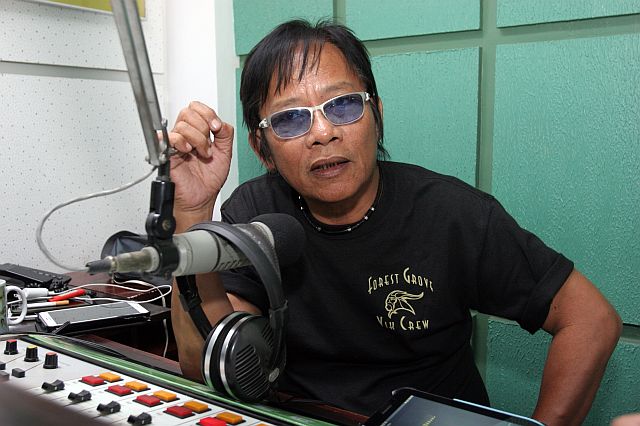
Alex Bolongaita of dyRF tells of his interview with Jeffrey “Jaguar” Diaz, who was killed in a police operation last Friday in Las Piñas City. (CDN PHOTO/JUNJIE MENDOZA)
TWO broadcast journalists who interviewed suspected drug lord Jeffrey “Jaguar” Diaz were surprised over his killing in an alleged shootout in Las Piñas City last Friday evening.
“Anogon (It is such a waste)” was how they expressed their sentiments saying they were convinced Jaguar wanted to get out of the illegal drug trade and start a new life.
Rowena “Wangwang” Capistrano, a reporter of radio station dyRF and dyRF anchorman Alex Bolongaita interviewed Jaguar last June 12. They said they were contacted by a man who told them Jaguar wanted to be interviewed, so they made the necessary arrangements for the interview.
“Makita man gud nato kon genuine ba o dili ang gisulti sa usa ka tawo. Based lang sa among interview, nagtuo ko nga gusto gyud siya (Diaz) magbag-o. (I could tell whether someone is being genuine or not. Based on our interview, I could see that Diaz wanted to change his life),” Capistrano told CDN.
She urged Diaz’ family to pray for his eternal repose.
“Only God knows who Jaguar really was,” said Capistrano who has been with dyRF for six years.
Bolongaita, a veteran broadcaster, believed in the capacity of every human being to change for the better.
“Giving people a chance is part of being a Christian. I was hoping that he (Jaguar) would be renewed,” said Bolongaita, a former seminarian who started his broadcast career as a disc jockey in 1982.
He felt Jaguar was sincere in his plan to abandon his old ways.
“He had regrets in life. And I was convinced that he wanted to change. In fact, he cried during the interview. If you cry, you must be sincere,” Bolongaita said.
He refused to reveal the exact location of the interview, but said it was within the Visayas region but not in Cebu.
Bolongaita also declined to comment on insinuations that Jaguar was killed in a rubout, particularly by policemen who feared that the alleged drug lord would reveal the identities of his connections, including those in the Philippine National Police.
“I will not venture into that. We in the media should be accurate in what we report,” he said.
While shooting back at criminals who engage authorities in a shootout is fine, Bolongaita said he still believes in due process of law.
“Personally, I don’t like the idea of killing criminals. We have due process except that there’s really much to be desired in our justice system,” he said.
Bolongaita said that during the interview, Diaz said he was raised in a poor family in Barangay Duljo-Fatima, Cebu City.
His mother earned money by selling mangoes while his father worked in a shipping company.
The second of seven children, Diaz stopped schooling after elementary since his parents didn’t have enough money.
Diaz said he began selling illegal drugs in small amounts until he was arrested by police in the City of Naga.
He was detained at the Cebu City Jail in 2005 and was eventually turned over to the National Bilibid Prison in Muntinlupa.
Inside the national penitentiary, Diaz met drug personalities and facilitated the trade between his supplier and his men in the field.
When he was released from jail in 2010, he returned to Cebu and established a bigger drug group. He was eventually placed among the top 10 drug personalities in Central Visayas.
After his release from the National Bilibid Prison, not a single criminal complaint was filed against Diaz in court, despite the fact that he had been tagged as a high-ranking drug personality.
A complaint was filed before the Prosecutor’s Office but to date has not been resolved.
He also had no existing arrest warrants based on the records of the Police Regional Office in Central Visayas.

